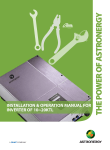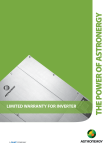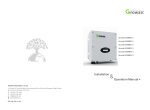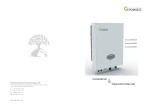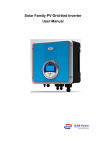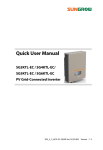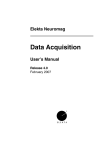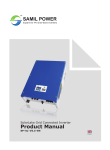Download Installation & Operation Manual for Inverter of 3.6~5KTL
Transcript
THE POWER OF ASTRONERGY INSTALLATION & OPERATION MANUAL FOR INVERTER OF 3.6~5KTL-M2 INSTALLATION & OPERATION MANUAL FOR INVERTER OF 3.6~5KTL-M2 1. Notes on this manual 1.1 1.2 1.3 Validity Target Group Safety 2. Astronergy Inverter 2.1 2.2 Overview Identifying model and basic datasheet 3. Unpacking and inspection 4. Installation 4.1 4.2 4.3 4.4 4.5 Safety instructions Selecting the INSTALLATION location Fixed the mounting on the wall Fixed the inverter on the wall Check Ivewrter installation Status 7. Modes of Operation 7.1 7.2 7.3 Normal mode Fault mode Shutdown mode 8. Inverter Status 9. Communitions 9.1 9.2 Monitoring Products Communication Type 10. Trouble Shooting 11. System Fault 12. Inverter Failure 13. Specifications 5. Electrical Connection 5.1 5.2 5.3 5.4 5.5 5.6 System Diagram with Inverter Electrical connection Safety Connecting to the grid (AC utility) Connecting to PV Panels(DC input) Selecting country by DIP switch Commissioning 14. Astronergy Factory warranty 15. Warranty conditions 16. Contact 6. Display 6.1 6.2 6.3 LCD display LCD control Setting the LCD display 1 1. Notes on this manual 1.1 Installation manual This manual describes the assembly, installation, commissioning and maintenance of the following Astronergy Inverters: CHPI 3.6KTL-M2 CHPI 4.2KTL-M2 CHPI 5KTL-M2 This manual does not cover any details concerning equipment connected to the CHPI KTL-M2 ( e.g. PV modules). Information concerning the connected equipment is available from the manufacturer of the equipment. 1.2 Target Group This manual is for qualified personnel. Qualified personnel have received training and have demonstrated skills and knowledge in the construction and operation of this device. Qualified Personnel are trained to deal with the dangers and hazards involved in installing electric devices. Additional information Find further information on special topics in the down load area at www. astronergy. com Notes: The manual and other documents must be stored in a convenient place and be available at all times. 1.3 Safety Appropriate Usage The Astronergy PV Inverter converts DC Current from PV generator into AC current. The Astronergy PV Inverter is suitable for mounting indoors and outdoors. You can use the AC current gernerated as follows: House grid: Energy flows into the house grid. The consumers connected, for example, household devices or lighting, consume the energy. The energy left over is fed into the public grid. When the Astronergy is not gernerating any energy, e.g., at night, the consumers which are connected are supplied by the public grid.The Astronergy does not have its own energy meter. When energy is fed into the public grid, the energy meter spins backwards. Public grid Energy is fed directly into the public grid. The Astronergy is connected to a separate energy meter. The energy produced is compensated at a rate depending on the electric power company. 2 Stand-alone grid: The Astronergy is connected to a stand-alone grid. A stand-alone grid is a grid which is not connected to a public grid ,the Astronergy needs a grid-forming generator in order to function, The energy generated is consumed directly on site, surplus energy can be stored in batteries.but the energy must not fed to the grid-forming generator. or it will destory the grid-forming generator. Alternative uses, modifications to the Astronergy PV inverter or the installation of component parts not expressly recommended or sold by Astronergy are not permitted. Persons with limited physical or mental abilities may only work with the Astronergy PV inverter following proper instruction and under constant supervision. Children are forbidden to play with the Astronergy PV inverter. Keep the Astronergy PV inverter away from children. DC and AC Switch Separate the Astronergy CHPI KTL-M2 securely from the grid and the PV generators using DC and AC Switch. DC and AC Switch shall be able to disconnect all unground conductors after installation. Notes: The Astronergy CHPI KTL-M2 include a DC switch ,if you turn off it when inverter is working , please waiting 5 minutes to turn on it again. Grounding the PV modules The CHPI KTL-M2 is a transformerless inverter. That is why it has no galvanic separation. Do not ground the DC circuits of the PV modules connected to the CHPI KTL-M2. Only ground the mounting frame of the PV modules. If you connect grounded PV modules to the CHPI KTL-M2, the error message “PV ISO Low”. Qualification of Skilled Workers • Knowledge of how an inverter works and is operated • Instruction in how to deal with the dangers and risks associated with installing and using electrical devices and plants • Training in the installation and commissioning of electrical devices and plants • Knowledge of all applicable standards and guidelines • Knowledge and observance of this manual and all safety instructions 3 2. Astronergy Inverter 2.1 Overview 2.2 Identifying model and basic datasheet PV Grid-connected Inverter You can identify the PV inverter by the type label. It is on the left-hand side of the enclosure. It includes follow information: Model Name ****************** U DC max ***V I DC max *A/**A U DC range ***V • The type of product (Type/Model). V AC norm ***V • Device-specific characteristics. f AC norm **Hz P AC norm *****W I AC norm **A PF (norm) 1.0 Protection Degree IP65 Operation Ambient -25°C - +60°C • Certificates and approvals. Temperature VDE-AR-N4105 4 3. Unpacking and inspection After opening the package, please check the contents of the box. It should contain the following: A B E D C Item Name Ouantity A Solar inverter 1 B Mounting frame 2 C Safety-lock screws 2 D Mounting screws 4 E Mounting frame screws sleeve 4 F Monitor software(disk) 1 (Optional) G manual 1 H Bluetooth 1 (Optional) Notes: Please check all of the accessories carefully in the carton. If anything missing, contact your dealer at once. Thoroughly inspect the packaging upon delivery, if you detect any damage to the packaging which indicates the inverter may be damaged, inform the responsible transport company immediately. We will be glad to assist you if required. 5 4. INSTALLATION 4.1 Safety instructions • All electrical installations shall be done in accordance with the local and national electrical codes. Do not remove the casing. Inverter contains no user serviceable parts. Refer servicing to qualified service personnel. all wiring and electrical installation should be conducted by a qualified service personnel . • Carefully remove the unit from its packaging and inspect for external damage. If you find any imperfections, please contact your local dealer. • Be sure that the inverters connect to the ground in order to protect property and personal safety. • The inverter must only be operated with PV generator. Do not connect any other source of energy to it. • Both AC and DC voltage sources are terminated inside the PV Inverter. Please disconnect these circuits before servicing. • This unit is designed to feed power to the public power grid (utility) only. Do not connect this unit to an AC source or generator. Connecting Inverter to external devices could result in serious damage to your equipment. • When a photovoltaic panel is exposed to light, it generates a DC voltage. When connected to this equipment, a photovoltaic panel will charge the DC link capacitors. • Energy stored in this equipment’s DC link capacitors presents a risk of electric shock. Even after the unit is disconnected from the grid and photovoltaic panels, high voltages may still exist inside the PV-Inverter. Do not remove the casing until at least 5 minutes after disconnecting all power sources. • Although designed to meet all safety requirements, some parts and surfaces of Inverter are still hot during operation. To reduce the risk of injury, do not touch the heat sink at the back of the PV-Inverter or nearby surfaces while Inverter is operating. • According to VDE-AR-N 4105,password is given for protection. For CEI 0-21, no password needed. 4.2 Safety instructions • The installation method and mounting location must be suitable for the weight and dimensions of the inverter. Select a wall or solid vertical surface that can support the PV-Inverter. • Mount on a solid surface, the mounting location must be accessible at all times. 6 • In living areas, do not mount the unit on plasterboard walls or similar to avoid audible vibrations. When in use, the inverter emits noises which may be perceived as a nuisance in a living area. • Vertical installation or tilted backwards by max. 15°. • The connection area must point downwards. • Do not install horizontally. • Be sure that the inverter is out of the children’s reach. • Don’t put any things on the inverter. Do not cover the inverter. 4.3 Safety instructions • Inverter requires adequate cooling space. Providing better ventilation for the inverter to ensure the heat escape adequately. The ambient temperature should be below 40°C to ensure optimum operation. • Do not expose the inverter to direct sunlight, as this can cause excessive heating and thus power reduction. • The ambient clearance needed is shown as following: (a) Ambient dimensions of one inverter 7 (b) Ambient dimensions of a series inverters There must be sufficient clearance between the individual inverters to ensure that the cooling air of the adjacent inverter is not taken in. If necessary, increase the clearance spaces and make sure there is enough fresh air supply to ensure sufficient cooling of the inverters. • Using the mounting frame as a template, drill 4 holes as illustrated in image. For CHPI 3.6KTL- M2 8 For CHPI 4.2KTL- M2 and CHPI 5KTL- M2 • Fix the mounting frame as the figure shows. Do not make the screws to be flush to the wall. Instead, leave 2 to 4mm exposed. 4.4 Fixed the inverter on the wall • Hang the inverter on the mounting frame. • Insert safety-lock screws to the bottom leg to secure the inverter. 9 4.5 Check Inverter Installation Status • Check the upper straps of PV-Inverter and ensure it fits on to the bracket. • Check the secure mounting of the PV-Inverter by trying to raise it from the bottom. The PV-Inverter should remain firmly attached. • Select the installation location so that the status display can be easily viewed. • Choose a strong mounting wall to prevent vibrations while inverter is operating. 5. Electrical Connection 5.1 System Diagram with Inverter Electrical connection • The inverter must be installed only by trained and authorized electricians • Before doing the electrical connection, both AC and DC end must be disconnected from all power sources. Always disconnect the AC line first, afterwards disconnect the PV lines. • Be sure that the inverters connect to the ground in order to protect property and personal safety. • PV Panel: Provide DC power to inverter. • Converts DC (Direct Current) power from PV panel(s) to AC (Alternating Current) power. Because Inverter is grid-connected it controls the current amplitude according to the PV Panel power supply. Inverter always tries to convert the maximum power from your PV panel(s). • Connection system: This “interface” between Utility and PV-Inverter may consist of electrical breaker, fuse and connecting terminals. To comply with local safety standards and codes, the connection system should be designed and implemented by a qualified technician. • Utility: Referred to as “grid” in this manual, is the way your electric power company provides power to your place. • we recommend electrical connection as follows: 10 5.2 Position Description A PV modules B DC load circuit breaker C Astronergy Inverter D AC load circuit breaker E Energy meter F Utility grid Safety The Astronergy Inverter must be connected to the AC ground from the utilityvia the Ground Terminal (PE) before wiring to the grid or PV panel! 5.3 Connecting to the grid (AC utility) Suggestion: It is suggested that each inverter should have an individual AC breaker in order that the inverter can be disconnected safely. Note: The PV-Inverter system capacitance can’t over 13.8KVA, because the inverter’s displacement factor adjust function had accorded to VDE-AR-N 4105. According to CEI 0-21, when the system capacity is smaller than 6KW, SPI needn’t to be modified, PF value can be set to 0.95. When the system capacity is bigger than 6KW, SPI need to change to be ‘External’, PF value can be set to 0.9. The inverter is equipped with an integrated all-pole sensitive residual current monitoring unit. The inverter can automatically distinguish between residual currents and “normal” capacitive leakage currents. 11 5.3.1 Connection of the AC wiring • Open the breaker or fuse between P V Inverter and utility. • For the inverter , connecting AC wires as follows: • the strip insulation length of L, N ,PE is 5mm. • all wires through the shell and screw to the AC terminal connect • screwing the shell to inverter and pressing screw cap tighten. Pin N Ground pressing s crew c ap terminal Pin L shell Wire requirements 5.4 Product Model _ (mm) Area(mm²) AWG no. CHPI 3.6KTL-M2 _2.59 5.260 10 CHPI 4.2KTL-M2 _2.59 5.260 10 CCHPI 5KTL-M2 _2.59 5.260 10 Connecting to PV Panels(DC input) Warning: • Risk of electric shock and fire, use only with PV modules with a maximum system voltage of 600Vdc! • For instance, if the positive pole of a string is connected at input zone A and the string’s negative pole at input zone B, this is called a mixed connection. Only connect strings at one input zone and never mix the input zones A and B! 12 Danger: • Before connecting the PV generator, ensure the DC-switch is switched off and that it cannot be reactivated. • Do not disconnect the DC connectors under load. There are two MPP trackers for Astronergy CHPI KTL-M2, you can connect two independent MPP channels. • Under any condition! Make sure the maximum open circuit voltage (Voc) of each PV string is less than 600Vdc. • Do not connect strings with an open circuit voltage greater than the Max. input voltage of the inverter. If the strings voltage exceeds the Max. input voltage of the inverter, it can be destroyed due to overvoltage. All warranty claims become void. • Check the design of the PV plant. The Max. open circuit voltage, which can occur at solar panels temperature of -10 °C, must not exceed the Max. input voltage of the inverter. • Open the independent DC circuit breaker as well as the DC switch on the Astronergy CHPI KTL-M2 inverter. • Before connecting PV panels to DC terminals, please make sure the polarity is correct. Incorrect polarity connection could permanently damage the unit. Check short-circuit current of the PV string. • Connect the positive and negative terminals from the PV panel to positive (+) terminals and negative (-) terminals on the PV-Inverter. Each MPP tracker’s max. input current as follow: 15A for CHPI 5KTL-M2 15A for CHPI 4.2KTL-M2 10A for CHPI 3.6KTL-M2 • High voltages exist when the PV panel is exposed to the sun. To reduce risk ofelectric shock, avoid touching live components and treat connection terminals carefully 13 Cable requirements: 5.5 Product Model _ (mm) Area(mm²) AWG no. CHPI 3.6KTL-M2 _2.59 5.260 10 CHPI 4.2KTL-M2 _2.59 5.260 10 CCHPI 5KTL-M2 _2.59 5.260 10 Selecting country by DIP switch When the cables of AC side and DC side are all well connected, before commissioning, the country safety standard must be selected by the DIP switch. 5.5.1 Location of the DIP switch The DIP switch is located on the left of the RS 232 interface at the bottom of the inverter, as the figure below. DIP Switch 2 3 1 4 6 5 7 1. DC Connector 2. RS 232 Interface 3. Antenna 4. AC Connector 5. RS 485 Interface 6.DC Switch 7.ground point NOTE: Before selecting country, please unscrew the dam-board of the DIP switch by appropriate tool. 14 The internal structure of the DIP switch is as the following figure: 4 5.5.2 3 2 1 DIP switch option corresponding to the country The DIP switch is composed of four-digit binary number PINS. The different combination of the four PINS can represent the last one character’s value of the inverter’s model, which is corresponding to different country. Each small white PIN has two statuses, when set upward to ‘ON’, its value turns to ‘1’, when set downward, its value turns to‘0’. Concerning the matching of the PIN status and the country, please refer to the table below: CHPI KTL-M2 DIP switch to country table DIP switch status Country Model display VDE 0126 CHXXXXXXX1 AS4777 CHXXXXXXX3 CEI 0-21 CHXXXXXXX4 Spain CHXXXXXXX5 15 DIP switch status 16 Country Model display Greece CHXXXXXXX6 VDE-AR-N 4105 CHXXXXXXX7 UK_G83 CHXXXXXXX8 Ireland CHXXXXXXX9 CGC CHXXXXXXXA Denmark CHXXXXXXXB UK_G59 CHXXXXXXXC Belgium CHXXXXXXXD Reserved CHXXXXXXXE Reserved CHXXXXXXXF After setting the DIP, please power on the inverter and check the model display. If the last character of the model name is corresponding to the country as the above table, it means your setting is successful. Attention: you should change the time displayed on the LCD of inverter to your local time after inverter starts up. NOTE: If the country is set incorrectly, please shut down the inverter and set again. 5.6 Commissioning • When the PV panels are connected and their output voltage is greater than 100 Vdc(Min. input voltage) but the AC grid is not yet connected, the message on the LCD display produce the following messages in order: “Astronergy Inverter”-> “Waiting” -> “No AC connection”. The display repeats “No AC connection” and the LED will be red. • Close the AC breaker or fuse between PV-Inverter and grid. The normal operating sequence begins. • When the voltage of the strings is greater than 150Vdc (start-up voltage), the inverter will check feeding conditions at once. If there is anything wrong during checking, the inverter will turn into the “Fault” state. • Under normal operating conditions the LCD displays “Power: xxxx.xW”. That is the power fed to the grid. The LED turns green. • This completes the check. 6. Electrical Connection 6.1 LCD display Starting-up display sequence, Once the PV power is sufficient, Inverter displays information as shown in the flow chart as follow: Module: xxxxxx SerNo: xxxxxxxxxx FW Version: x.x.x Connect in: xxS Connect : OK xxxx.xVA xxxx.x W 17 6.2 LCD control To save power, the LCD display’s backlight automatically turns off after 30 seconds. The display on the inverter can be control by Knock on the front of it. The first line will show some status of the inverter, there are 5 status listed in below table. The First Line Of LCD STATE DISPLAY CONTENT REMARK Standby PV voltage low Waiting Initial waiting Connect in xxS System checking Reconnect in xxS System checking Connect OK Connect to Grid xxxx.xVA xxxx.x W Inverter watt at working Fault State Error: xxx System Fault Auto Test State Auto Testing Protection auto test Program State Programming Update Software Wait State Inverter State While Astronergy inverter is working, the first line will normally show Power status: The Second line can change by knock on The Second Line Of LCD CYCLE DISPLAY 18 DISPLAY TIME/S REMARK 2 The inverter model 2 The software version CYCLE DISPLAY DISPLAY TIME/S REMARK 2 The Serial Number 4 The energy today 4 The energy all 4 PV input watt 4 The PV and Bus Votage 4 The grid system 4 The enable auto test 4 Set Language 4 Set Communications Address 4 Setting exter wireless or inter wireless ,Rs232 4 Setting Zigbee PIN/Bluetooth PIN 19 CYCLE DISPLAY 6.3 DISPLAY TIME/S REMARK 2 Setting Zigbee Channel 4 record of the 5 latest grid faults 4 Setting year/month/day/time Setting the LCD display Sound control can define the display language, luminance of the display, auto test etc. when the LCD is dark, any knock to make it bright, and then single knock to make it display next item or change the setting options. Double knock can either make the displays stayed for 30s or enter the options which need to be modified. Setting language When the LCD stays bright, single knock to ‘set language’, and then double knock to enter the language options. Single knock to select the language you want, when setting finishes, wait for 30s or triple knock to save your setting. Setting COM Address When the LCD stays bright, single knock to ‘COM Address: xxx’, and then double knock to enter the setting status, single knock to change the COM Address. When setting finishes, wait for 30s or triple knock to save your setting. Auto test When the LCD stays bright, single knock to ‘Enable Auto Test’, and then double knock to enter ‘Waiting to start’, and then single knock to start auto test and wait for the test results. Communication Type • RS 232 • Inter wireless • Exter wireless (NOTE: RS485 is the standard communication type of the inverter) 20 Communication Mode Setting Steps: 1. When the LCD stays bright, single knock until the LCD displays ‘RS232’, at this interface the communication type can be selected. 2. Double knock to enter the options, the options will flash. Single knock to select the option you want. 3. When setting finishes, wait for 30s or triple knock to save your setting. Attention: if you select RS 232 or Exter wireless, you must set the 2-PIN switch to different status. The 2-PIN switch is located beside the RS 232 interface, as the figure below. 2 1 21 a. when ‘RS 232’ is selected, you have to set PIN1 of the switch downward to OFF. b. When ‘Exter wireless’ is selected, you have to set PIN1 of the switch upward to ON. c. When ‘Inter wireless’ is selected, RS 232 interface will be disabled. Under this mode,if what integrated internally is Zigbee, PIN and Channel need to be set, if what integrated internally is Bluetooth, only PIN needs to be set. PIN XXXX Single knock on LCD to ‘PIN XXXX’, and then double knock to make each number of the PIN flashes. Then single knock to change the number to what you want it to be, the PIN should be same as AstronergyWebbox or AstronergyPano. When setting finishes, wait for 30s or triple knock to save your setting. Channel :XX Single knock on LCD to ‘Channel: XX’, and then double knock to make each number of Channel flashes. Then single knock to change the number to what you want it to be, the PIN should be same as AstronergyWebbox or AstronergyPano. When setting finishes,wait for 30s or triple knock to save your setting. Setting time When the LCD stays bright, single knock until LCD displaying ‘xxxx/xx/xx xx:xx’, and then double knock to enter the setting status, the numbers begin to flash. Single knock to change the number, each knock makes the flashing number add ‘1’, and double knock to shift to next number setting. When setting finishes, wait for 30s or triple knock to save your setting. AC Error Record Checking When the LCD stays bright, single knock to ’AC Error Record’, and then double knock to enter the checking status. Single knock to check each error item, triple knock can exit. 22 7. MODES OF OPERATION There are 3 different modes of operation. 7.1 Normal mode In this mode, Inverter works normally. Whenever the supplied power from PV panel is sufficient (voltage>150Vdc), Inverter converts power to the grid as generated by the PV panel. If the power is insufficient(voltage<120Vdc), Inverter enters a “waiting” state. Whilst “waiting” Inverter uses just enough power from the PV panel monitor internal system status. In normal mode the LED is green. 7.2 Fault mode The internal intelligent controller can continuously monitor and adjust the system status. If Inverter finds any unexpected conditions such as grid problems or internal failure, it will display the information on its LCD and the LED will be red. 7.3 Shutdown mode During periods of little or no sunlight, Inverter automatically stops running. In this mode, Inverter does not take any power from the grid. The display and LED’s on the front panel do not work. Notes: Operating inverter is quite easy. During normal operation, Inverter runs automatically. However, to achieve maximum conversion efficiency of Inverter, please read the following information: Automatic ON-OFF: Inverter starts up automatically when DC-power from the PV panel is sufficient. Once the PV-Inverter starts up, it enters one of the following 3 states: 1. Standby: The PV string can only provide just enough voltage to minimum requirements of the controller. 2. Waiting: When the PV string DC voltage is greater than 100V, Inverter enters “waiting” state and attempts to connect to the grid. 3. Normal operation: When PV string DC voltage is greater than 150V, Inverter operates in the normal state. 8. INVERTER STATUS Inverter is designed to be user-friendly; therefore, the status of the Inverter can be easily understood by reading the information shown on the front panel display. All possible messages are shown in the following table. 23 system fault DISPLAY OPERATION Auto Test Failed Auto Test do not pass No AC Connection No Utility, No Grid Connect PV Isolation Low Insulation Problem Residual I High leakage current too high Output High DCI Output Current DC Offset too high PV Voltage High PV panel Voltage too high AC V Outrange Grid Voltage out of range AC F Outrange Grid Frequency out of range Over Temperature temperature outrange DISPLAY OPERATION Error: 101 Redundant CPU Communication Fault Error: 102 Consistent Fault Error: 116 EEPROM Fault Error: 117 Relay Fault Error: 118 Init Model Fault Error: 119 GFCI Fault Error: 120 HCT Fault Error: 121 Main CPU Communication Fault Error: 122 Bus Voltage Fault Inverter fault The latest 5 NS(Network and System) protection records can be read by LCD or communication software. An interruption of ≤ 3Sec to the power supply does not lead to any loss of fault records (according to VDE-AR-N 4105, cl.6.5.1). 24 9. Communication 9.1 Monitoring Products 9.1.1 Astronergy Net Astronergy NET is a PC software that communicate with inverter to analyze the inverter working state. It is convenient for you to know the inverter’s real-time working state and the history work information. Specification: • Communicate with inverter by RS 232 and Bluetooth. • Construct net with inverter, GRO monitor and Astronergy NET by RS 232, Bluetooth and Internet. • Two Interfaces: Multi Inverter Interface and Wave Data Interface. • In Multi Inverter Interface: See at most 4 inverters working data at the same time, you can select your own compare inverters and parameters. • In Wave Data Interface: Query the inverter real time and history power wave, work data and error information. • Multi languages: English, French, German, Spanish and etc. • Support OS: WinXP/ Vista/win7/2000/2003. 9.1.2 Astronrgy Vision Astronergy Vision, which consists of a power monitor and a number of transmitters, can achieve 1 to 6 monitoring modes. The transmitters transmit the power data collected from a photovoltaic inverter to the monitor and display the data onto the monitor screen, as along as data of generated energy, the gross generated energy and the generation income obtained from the above-mentioned data through some simple calculations. We can also see 3-phase AC voltage, two-way PV voltage, indoor temperature, date and time, as well as CO2 emissions. Astronrgy Vision 25 9.1.3 Astronergy Pano Astronergy Pano have a large touch screen, customers can browse data or set communication parameters, inverter parameters by touching easily. It is designed for solar power plant remote monitoring. While supporting both wired and wireless communication, Astronergy Pano can simultaneously monitor, record and analyze inverter operating parameters real time with a maximum quantity of 50. Monitored data also can be sent to Astronergy Server. Astronrgy Pano 9.1.4 Astronergy WebBox Astronergy WebBox is specially designed for solar power plant remote monitoring. While supporting both wired and wireless communication, Astronergy WebBox can simultaneously monitor, record and analyze inverter operating parameters real time with a maximum quantity of 50. Monitored data can be sent to AstronergyServer. Astronrgy WebBox Detailed introduction please refer to Astronergy WebBox User Manual. 9.1.5 Astronergy Server Astronergy Server is a remote data server, it is based on B/S structure. It can receive monitoring data from Astronergy WebBox or Astronergy Pano, and publish monitored data to LAN or WAN. User can easily access data browse interface via an Internet Explorer 26 9.2 Communication Type 9.2.1 RS 485 (standard) RS 485 is used for multipoint communication. Astronergy WebBox can monitor 32 units at the same time. But the Max length of the cable should not exceed 1000m. The monitoring system layout for one inverter is as follows: Internet PC Router Astronergy WebBox RS 485 We recommend the monitoring system layout for a number of inverters as follows: Public Grid Radio ripple Control receiver Astronergy WebBox PC Router RS 485 Internet Definitions of RS 485 plug pins as follows: • Pin1------- RX_ R 485 • Pin2------- TX_RS 485 The program “Astronergy Server ” operating on the PC can provide real-time monitoring of these inverters via Astronergy WebBox. 27 9.2.2 RS232 (standard) RS 232 is used for single point communication. Use a RS 232 cable to connect from inverter’s RS 232 port to computer’s RS 232 port, or to connect to a RS 232-to-USB converter, then connect to computer’s USB port. And then run AstronergyNet to monitor the inverter. 9.2.3 External Bluetooth / Zigbee (Optional) Bluetooth wireless can be used as an optional monitoring scheme. Simply insert Bluetooth module (It is available from Astronergy) to inverter’s RS 232 port, then run AstronergyNet in a computer (with a Bluetooth adapter). Zigbee wireless monitoring must be used with AstronergyPano or AstronergyWebbox. 9.2.4 Internal integrated Bluetooth / Zigbee / WiFi (Optional) If customer required, as an option, Bluetooth module / Zigbee module / WiFi module can be integrated to internal of inverter. 10. TROUBLE SHOOTING In most situations, the Inverter requires very little service. However, if Inverter is not able to work perfectly, please refer to the following instructions before calling your local dealer. Should any problems arise, the LED on the front panel will be red and the LCD displays the relevant information. Please refer to the following table for a list of potential problems and their solutions. 11. SYSTEM FAULT Ground Fault 1. The ground current is too high. 2. Unplug the inputs from the PV generator and check the peripheral AC system. 3. After the cause is cleared, re-plug the PV panel and check PV-Inverter status. 4. If the problem persists please call service. Isolation Fault 1. Check the impedance is between PV (+) & PV (-) and the PV-Inverter is earthed. The impedance must be greater than 8M. 2. If the problem persists please call service. 28 No Utility 1. Grid is not connected. 2. Check grid connection cables. 3. Check grid usability. 12. INVERTER FAILURE PV Over Voltage 1. Check the open PV voltage, if it is greater than or too close to 600VDC. 2. If PV voltage is less than 600VDC, and the problem still occurs, please call local service. Consistent Fault 1. Disconnect PV (+) or PV (-) from the input, restart the PV-Inverter. 2. If it does not work, call service. > If there is no display on the panel, please check PV-input connections. If the voltage is higher than 150V, call your local service. > During periods of little or no sunlight, the PV-Inverter may continuously start up and shut down. This is due to insufficient power generated to operate the control circuits. 13. SPECIFICATIONS CHPI 3.6KTL-M2 CHPI 4.2KTL-M2 CHPI 5KTL-M2 Max. DC power 3800W 4400W 5000W/5200W Max. DC voltage 600V 600V 600V Start voltage 150V 150V 150V DC nominal voltage 360V 360V 360V PV voltage range 100V-600V 100V-600V 100V-600V MPP voltage range Number of MPP trackers/ 175V-550V 175V-550V 175V-550V strings per MPP tracker Max. input current / 2/2 2/2 2/2 per string 2X10A/10A 2X15A/15A 2X15A/15A Input Data 29 CHPI 3.6KTL-M2 CHPI 4.2KTL-M2 CHPI 5KTL-M2 Nominal AC output power 3600W 4200W 4600W Max. AC apparent power 3600VA 4200VA 4600VA * Nominal output current 15.6A 18.5A 20A Max. output current 18A 21A 23A ** AC nominal voltage; range 220V / 230V / 240V 180Vac - 280Vac 220V / 230V / 240V 180Vac - 280Vac 220V / 230V / 240V 180Vac - 280Vac AC grid frequency; range 50Hz,60Hz;±5Hz 50Hz,60Hz;±5Hz 50Hz,60Hz;±5Hz Phase factor at rate power 1 1 1 Displacement power factor, configurable *** 0.9leading… 0.9lagging 0.9leading… 0.9lagging 0.9leading… 0.9lagging THDI <3% <3% <3% AC connection Single phase Single phase Single phase Input Data * 4600VA with VDE-AR-N 4105 , CEI0-21 ** 23A with output power 4600W *** 0.95leading…0.95lagging with VDE-AR-N 4105 0.95leading…0.95lagging with CEI 0-21 (System power less than 6KW) 0.9leading…0.9lagging with CEI 0-21 (System power larger than 6KW) Protection Devices DC reverse polarity protection yes yes yes AC short-circuit protection yes yes yes Ground fault monitoring yes yes yes Grid monitoring yes yes yes Integrated all-pole sensitive leakage current monitoring unit yes yes yes Max . efficiency 97.1% 97.1% 97.1% Euro-eta 96.5% 96.5% 96.5% MPPT efficiency 99.5% 99.5% 99.5% Efficiency 30 CHPI 3.6KTL-M2 CHPI 4.2KTL-M2 CHPI 5KTL-M2 Dimensions (W / D / H) in mm 360/510/188 360/510/188 360/510/188 Weight 24 KG 24 KG 24 KG Operating temperature range –25°C..+60°C –25°C..+60°C –25°C..+60°C Noise emission (typical) ≤ 25 dB(A) ≤ 25 dB(A) ≤ 25 dB(A) Altitude Up to 2000m without power derating Up to 2000m without power derating Up to 2000m without power derating <5W /< 0.5 W <5W /< 0.5 W <5W /< 0.5 W Topology transformerless transformerless transformerless Cooling concept No fan No fan No fan Installation: Indoors / Outdoors (IP65 electronics ) yes / yes yes / yes yes / yes DC connection: MC3/MC4/H4 opt / opt / yes opt / opt / yes opt / opt / yes AC connection: Terminals yes yes yes LCD displqy yes yes yes Interfaces: Bluetooh / RS 485 / RS 232 opt / yes / yes opt / yes / yes opt / yes / yes Warranty:5years / 10years yes / opt yes / opt yes / opt General Data Consumption: operating (standby) / night Features Certificates and approvals CE,IEC 62109, VDE 0126-1-1, VDE-AR-N4105, CEI 0-21 RD1663,G59,G83, AS4777, AS/NZS 3100. CHPI 3.6KTL-M2 CHPI 4.2KTL-M2 CHPI 5KTL-M2 14. Astronergy Factory warranty This certificate represents a 5 year warranty for the Astronergy inverter products listed below. Possession of this certificate validates a standard factory warranty of 5 years from the date of purchase. Warranted products This warranty is applicable solely to the following products: CHPI 3.6KTL-M2, CHPI 4.2KTL-M2, CHPI 5KTL-M2 31 Limited Product Warranty (Applicable under normal application, installation, use and service conditions) Astronergy warrants the above listed products to be free from defects and/or failure specified for a period not exceeding five (5) years from the date of sale as shown in the Proof of Purchase to the Original purchaser. The warranties described in these “Limited Warranties ” are exclusive and are expressly in lieu of and exclude all other warranties, whether written, oral, express or implied, including but not limited to, warranties of merchantability and of fitness for a particular purpose, use ,or application, and all other obligations or liabilities on the part of Astronergy , unless such other obligations or liabilities are expressly agreed to it in writing signed and approved by Astronergy , Astronergy shall have no responsibility or liability whatsoever for damage or injury to persons or property, or for other loss or injury resulting from any cause whatsoever arising out of or related to the modules, including, without limitation, any defects in the modules or from use or installation. Under no circumstances shall Astronergy be liable for incidental, consequential or special damages howsoever caused; loss of use, loss of production, loss of revenues are therefore specifically and without limitation excluded to the extent legally permissible, Astronergy ’s aggregate liability, if any, in damages or otherwise, shall not exceed the invoice as paid by the customer. The “Limited Product Warranties” described above shall not apply to, and Astronergy shall have no obligation of and kind whatsoever with respect to, any inverter which has been subjected to: — Misuse, abuse, neglect or accident; — Alteration, improper installation or application; — Unauthorised modification or attempted repairs; — Insufficient ventilation of the product; — Transport damage; — Breaking of the original manufacturers seal; — Non-observance of Astronergy installation and maintenance instruction; — Failure to observe the applicable safety regulations — Power failure surges, lighting, flood, fire, exposure to incorrect use, negligence, accident, force majeure, explosion, terrorist act, vandalism or damage caused by incorrect installation, modification or extreme weather conditions or other circumstances not reasonably attributable to Astronergy. Liability The warranty shall also cease to apply if the product cannot be correctly identified as the product of Astronergy. Warranty claims will not be honored if the type of serial number on the inverters have been altered, removed or rendered illegible. 32 Liability The liability of Astronergy in respect of any defects in its PV inverters shall be limited to compliance with the obligations as stated in these terms and conditions of warranty. Maximum liability shall be limited to the sale price of the product.Astronergy shall accept no liability for loss of profit, resultant of indirect damage, any loss of electrical power and / or compensation of energy suppliers within the express meaning of that term. The warranty rights as meant herein are not transferable or assignable to any third party excepting the named warranty holder. 15. Warranty conditions If a device becomes defective during the agreed Astronergy factory warranty period and provided that it will not be impossible or unreasonable, the device will be, as selected by Astronergy, 1. Shipped to a Astronergy service center for repair, or 2. repaired on-site, or 3. exchanged for a replacement device of equivalent value according to model and age. The warranty shall not cover transportation costs in connection with the return of defective modules. The cost of the installation or reinstallation of the modules shall also be expressly excluded as are all other related logistical and process costs incurred by all parties in relation to this warranty claim. 16. Contact If you have technical problems concerning our products, contact your installer or Astronergy. During inquiring, please provide below information: 1. Inverter type 2. Modules information 3. Communication method 4. Serial number of Inverters 5. Error code of Inverters 6. Display of inverters 33 JIUQUAN, CHINA RAVENSBURG, GERMANY SAN FRANCISCO, USA SEOUL, KOREA TOKYO, JAPAN SHANGHAI, CHINA HANGZHOU, CHINA BARCELONA, SPAIN BANGKOK, THAILAND CORPORATE HEADQUARTERS SUBSIDIARIES Chint Solar (ZheJiang) Co., Ltd. 1335 Bin’an Road, Binjiang District Hangzhou, Zhejiang Province, 310053 China Tel: + 86 571 5603 1888 Fax: + 86 571 5603 2383 Spain Chint Solar Hispania S.L. Paseo de Gracia, 78, 2-2A 08008 Barcelona, Spain Tel: + 34 9346 73778 Fax: + 34 9346 73789 Japan KoyoAstro Co., Ltd. 1-5-6, Higashi-Nihonbashi, Chuo-ku, Tokyo 103-0004, Japan Tel: + 03 5820 2141 Fax: + 03 5820 2142 MANUFACTURING PLANTS Germany Astronergy GmbH Karlstr. 8 88212 Ravensburg, Germany Tel: + 49 (0)751 295096-10 Fax: + 49 (0)751 295096-39 Korea Astronergy Solar Korea 5th FL. Cowell Bldg, 66-1, Banpo-Dong, Seocho-Gu, Korea Tel: + 82 (0)2 2226 3911 Fax: + 82 (0)2 2226 3910 North America Astronergy Solar, Inc. Suite 1125, 795 Folsom Street, San Francisco, CA 94107 USA Thailand Astronergy Solar Korea (Thailand) Co., Ltd. 184/88 Forum Tower 18FL Ratchadapisek Rd., Huay-Kwang, Bangkok 10320 Thailand Tel: + 662 645 4155 Fax: + 662 245 3185 Hangzhou, Shanghai & Jiuquan Tel: +1 650 392 2777 http://www.astronergy.com © 1382 P / 03 - 2013




































